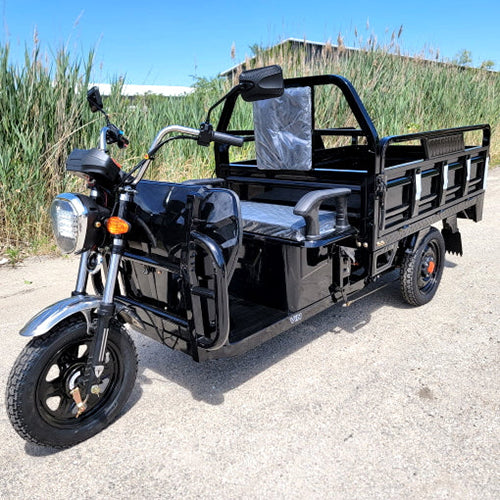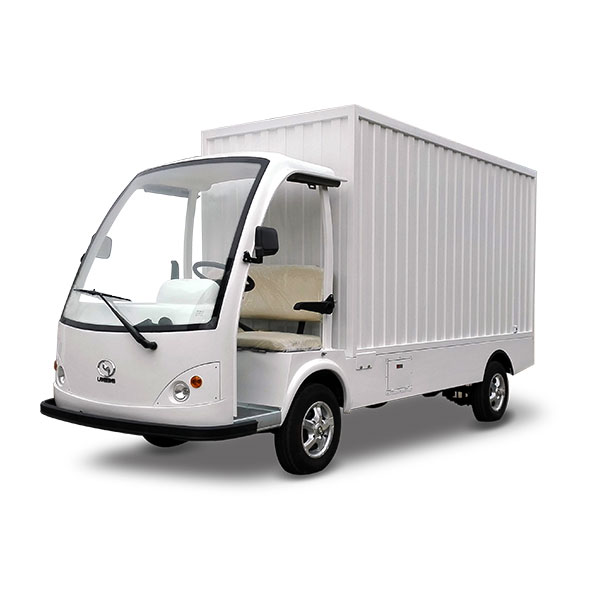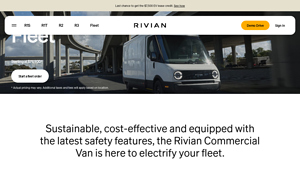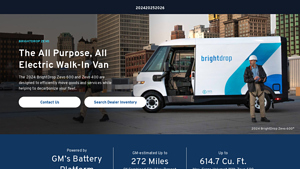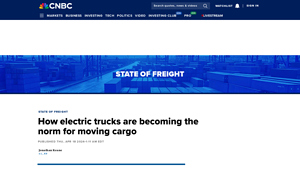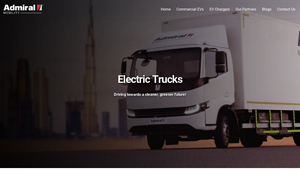Introduction: Navigating the Global Market for cargo electric truck
As businesses worldwide strive to reduce their carbon footprint and transition to sustainable practices, the challenge of sourcing cargo electric trucks becomes increasingly pertinent. International B2B buyers, especially in regions like Africa, South America, the Middle East, and Europe, face unique hurdles in identifying reliable suppliers, understanding diverse vehicle specifications, and navigating the complexities of local regulations. This guide serves as a comprehensive resource, covering the various types of cargo electric trucks, their applications across different industries, and essential considerations for supplier vetting and cost analysis.
Within this guide, you will find detailed insights into the latest electric truck models, including specifications tailored to urban logistics, regional transport, and construction needs. We delve into the technological advancements that enhance operational efficiency and sustainability, such as varying charging solutions and payload capacities. Additionally, the guide addresses critical factors affecting total cost of ownership (TCO), enabling you to make informed purchasing decisions that align with your organization’s financial and environmental goals.
By equipping international buyers with actionable insights and practical knowledge, this guide empowers you to navigate the evolving global market for cargo electric trucks. Whether you are in Vietnam, Nigeria, or any other emerging market, understanding these dynamics will enhance your ability to invest wisely in electric commercial vehicles that meet your operational demands while contributing to a greener future.
Understanding cargo electric truck Types and Variations
| Type Name | Key Distinguishing Features | Primary B2B Applications | Brief Pros & Cons for Buyers |
|---|---|---|---|
| Regional Haul Electric | Designed for regional and interregional transport; high cargo capacity | Freight logistics, construction materials | Pros: Zero emissions, reduced noise; Cons: Limited range compared to diesel trucks. |
| Urban Delivery Electric | Compact design for navigating city streets; optimized for short distances | Grocery delivery, package logistics | Pros: Maneuverable, eco-friendly; Cons: Smaller cargo space, range limitations. |
| Heavy-Duty Electric | Built for heavy loads and rugged conditions; higher GVWR | Construction, waste management | Pros: High payload capacity, robust design; Cons: Higher upfront costs, longer charging times. |
| Cargo Van Electric | Versatile configurations; available in multiple sizes | Last-mile delivery, service industry | Pros: Flexibility in cargo space; Cons: May require specialized charging infrastructure. |
| Step Van Electric | Step-in design for easy access; ideal for urban deliveries | Food trucks, mobile workshops | Pros: Efficient loading/unloading; Cons: Limited range for larger deliveries. |
What Are the Key Characteristics of Regional Haul Electric Trucks?
Regional haul electric trucks are engineered for transporting goods over medium to long distances, often between cities. These trucks boast high cargo capacities and are equipped with advanced battery technology to support extended range requirements. B2B buyers should consider the truck’s charging infrastructure and operational range, ensuring it aligns with their logistics needs.
How Do Urban Delivery Electric Trucks Stand Out?
Urban delivery electric trucks are specifically designed for maneuverability in tight city environments. Their compact size allows for easy navigation through congested streets, making them ideal for grocery and package deliveries. When purchasing, businesses should evaluate the trade-offs between cargo space and the benefits of reduced emissions and noise pollution.
What Should Buyers Know About Heavy-Duty Electric Trucks?
Heavy-duty electric trucks are built to handle demanding tasks, such as construction and waste management, with high gross vehicle weight ratings (GVWR). Their robust construction allows for significant payload capacities, making them suitable for industries requiring heavy lifting. Buyers should assess the upfront investment versus long-term savings on fuel and maintenance.
Why Choose Cargo Van Electric Options?
Cargo van electric trucks offer versatility with various configurations, catering to last-mile delivery and service industries. They provide ample space for equipment and goods while maintaining eco-friendly operations. Buyers must consider the charging requirements and potential need for infrastructure upgrades when integrating these vehicles into their fleet.
What Are the Benefits of Step Van Electric Trucks?
Step van electric trucks feature a step-in design that facilitates easy access for drivers and loaders, making them perfect for urban deliveries, including mobile food services. Their design optimizes the loading and unloading process, enhancing operational efficiency. However, businesses should be mindful of range limitations, especially for longer delivery routes.
Key Industrial Applications of cargo electric truck
| Industry/Sector | Specific Application of cargo electric truck | Value/Benefit for the Business | Key Sourcing Considerations for this Application |
|---|---|---|---|
| Logistics & Distribution | Last-mile delivery in urban areas | Reduced operational costs and enhanced sustainability | Range capabilities, charging infrastructure, payload capacity |
| Construction | Transportation of materials and equipment | Lower emissions and noise levels, improving site safety | Load capacity, durability in rough conditions, maneuverability |
| Waste Management | Collection and transportation of waste | Compliance with environmental regulations, lower noise | Vehicle size for urban environments, charging options |
| Retail & E-commerce | Grocery and package deliveries | Improved customer satisfaction and brand image | Delivery range, vehicle configurations, temperature control |
| Public Services | Municipal service vehicles for maintenance | Enhanced community relations and lower emissions | Customization options, safety features, fleet management capabilities |
How Are Cargo Electric Trucks Used in Logistics & Distribution?
In the logistics and distribution sector, cargo electric trucks are increasingly utilized for last-mile delivery in urban areas. They address the growing demand for sustainable transportation solutions while reducing operational costs associated with fuel and maintenance. International buyers, particularly in regions like Africa and South America, must consider the range capabilities and charging infrastructure available in their locales to ensure these vehicles can operate efficiently. Additionally, payload capacity is crucial to meet diverse delivery requirements.
What Role Do Cargo Electric Trucks Play in Construction?
For the construction industry, cargo electric trucks facilitate the transportation of materials and equipment to job sites. Their lower emissions and quieter operation contribute to improved site safety and compliance with environmental regulations. Buyers from regions with stringent emissions standards, such as Europe, should prioritize durability and load capacity in their purchasing decisions, ensuring the vehicles can withstand rough terrain and heavy loads while maintaining maneuverability in confined spaces.
How Are Cargo Electric Trucks Transforming Waste Management?
Cargo electric trucks are revolutionizing waste management by serving as collection and transportation vehicles that minimize environmental impact. With their zero-emission capabilities, these trucks help municipalities comply with increasing environmental regulations while reducing noise pollution in urban settings. Buyers must consider the vehicle size suitable for navigating narrow streets and the availability of convenient charging options to ensure efficient operations in densely populated areas.
How Do Cargo Electric Trucks Enhance Retail & E-commerce Deliveries?
In the retail and e-commerce sectors, cargo electric trucks are pivotal for grocery and package deliveries, enabling businesses to improve customer satisfaction through timely and reliable service. The sustainability aspect of electric trucks can enhance a brand’s image in a market increasingly focused on eco-friendliness. Buyers should evaluate delivery range, vehicle configurations, and temperature control features, especially for transporting perishable goods, to meet the diverse needs of their customer base.
What Benefits Do Cargo Electric Trucks Offer Public Services?
Public services utilize cargo electric trucks for various maintenance activities, enhancing community relations through their environmentally friendly operations. These vehicles can effectively reduce emissions while performing essential tasks, making them an attractive option for municipalities. When sourcing, buyers should look for customization options that align with specific service requirements, as well as robust safety features to ensure the well-being of both drivers and the public.
3 Common User Pain Points for ‘cargo electric truck’ & Their Solutions
Scenario 1: Navigating Limited Charging Infrastructure for Electric Cargo Trucks
The Problem: One of the most significant challenges B2B buyers face when considering cargo electric trucks is the limited availability of charging infrastructure, especially in regions like Africa and parts of South America. Many businesses worry about the feasibility of long-haul deliveries when charging stations are sparse. This concern becomes even more pronounced in rural or less-developed areas, where logistics can be complex and costly. The fear of running out of battery mid-route, coupled with the potential delays caused by inadequate charging facilities, can deter companies from making the switch to electric.
The Solution: To effectively address this issue, businesses should conduct a thorough analysis of their operational routes and identify strategic locations for charging stations. Partnering with local governments or private entities to invest in charging infrastructure can be a long-term solution. Additionally, companies can explore electric trucks that offer extended range capabilities, such as models with larger battery packs or fast-charging options. Investing in a fleet management system can also optimize routes to ensure that trucks are always within range of a charging station, reducing downtime. Furthermore, companies might consider collaborating with charging network providers to gain access to a broader range of charging points, ensuring their trucks remain operational and efficient.
Scenario 2: Understanding Total Cost of Ownership for Electric Cargo Trucks
The Problem: Many B2B buyers struggle to understand the total cost of ownership (TCO) when transitioning to cargo electric trucks. Initial purchase prices can be higher than their diesel counterparts, leading to uncertainty about long-term savings. This confusion is often exacerbated by fluctuating energy costs, maintenance expenses, and potential government incentives. Businesses may hesitate to invest in electric trucks due to fears of hidden costs that could affect their bottom line.
The Solution: To gain a clear understanding of TCO, companies should develop a comprehensive financial model that includes all relevant factors. This model should account for purchase price, maintenance costs, energy consumption, and potential tax credits or incentives for electric vehicle purchases. Additionally, businesses can leverage tools and calculators provided by manufacturers to project savings based on their specific use cases. Engaging with financial advisors who specialize in commercial vehicle investments can also provide insights into the long-term benefits of switching to electric. By presenting a well-researched case for TCO to stakeholders, businesses can make informed decisions that align with their financial goals.
Scenario 3: Ensuring Adequate Training for Drivers and Maintenance Staff
The Problem: Transitioning to cargo electric trucks often requires a significant shift in operational practices, particularly regarding driver training and maintenance. Many businesses are concerned about their existing workforce’s ability to adapt to new technologies, especially if they have been accustomed to traditional diesel vehicles. The lack of familiarity with electric truck operation and maintenance can lead to inefficiencies, safety risks, and increased costs.
The Solution: To mitigate these challenges, companies should prioritize comprehensive training programs for both drivers and maintenance personnel. Collaborating with manufacturers can provide access to specialized training resources, including workshops and online courses tailored to electric truck operations and maintenance. Additionally, creating a mentorship program where experienced drivers guide others can foster a culture of learning and adaptation. Investing in simulation tools that allow drivers to practice in a virtual environment can also enhance their readiness. Regular training updates and assessments will ensure that all staff members remain informed about the latest technologies and safety protocols, ultimately leading to smoother operations and better performance in the field.
Strategic Material Selection Guide for cargo electric truck
What Are the Key Materials Used in Cargo Electric Trucks?
The selection of materials for cargo electric trucks significantly influences their performance, durability, and overall cost-effectiveness. Below, we analyze four common materials used in the construction of these vehicles, focusing on their properties, advantages, disadvantages, and considerations for international B2B buyers.
How Does Aluminum Affect Cargo Electric Truck Performance?
Key Properties: Aluminum is lightweight yet strong, with excellent corrosion resistance and a high strength-to-weight ratio. It can withstand a wide range of temperatures, making it suitable for various climates.
Pros & Cons: The primary advantage of aluminum is its lightweight nature, which contributes to improved energy efficiency and payload capacity. However, it can be more expensive than steel and may require specialized welding techniques, increasing manufacturing complexity.
Impact on Application: Aluminum is particularly beneficial in components like the truck body and chassis, where weight reduction is crucial for enhancing range and efficiency. Its corrosion resistance is vital for vehicles operating in humid or coastal environments.
Considerations for International Buyers: Buyers in regions like Africa and South America should consider the availability of aluminum and the associated costs. Compliance with international standards, such as ASTM for materials, is essential to ensure quality and safety.
What Role Does Steel Play in Cargo Electric Trucks?
Key Properties: Steel is known for its high tensile strength and durability. It can withstand significant stress and is resistant to deformation under load, making it ideal for structural components.
Pros & Cons: The main advantage of steel is its robustness and lower cost compared to aluminum. However, it is heavier, which can negatively impact energy efficiency and range. Additionally, steel is prone to corrosion if not adequately treated.
Impact on Application: Steel is often used in the frame and suspension systems of electric trucks, where strength and durability are paramount. Its weight can be a disadvantage in terms of energy consumption, but it provides a solid foundation for heavy loads.
Considerations for International Buyers: Steel standards vary globally, and compliance with local regulations (like JIS in Japan or DIN in Germany) is crucial. Buyers should also consider the availability of high-strength steel options to optimize weight and performance.
How Does Composite Material Enhance Cargo Electric Truck Design?
Key Properties: Composites, such as carbon fiber and fiberglass, offer high strength-to-weight ratios and excellent corrosion resistance. They can be engineered to meet specific performance requirements, including thermal stability.
Pros & Cons: The key advantage of composites is their lightweight nature, which can significantly improve energy efficiency. However, they are often more expensive and can be challenging to repair if damaged.
Impact on Application: Composites are ideal for body panels and interior components where weight savings are critical. Their resistance to corrosion and environmental factors makes them suitable for diverse climates.
Considerations for International Buyers: The use of composites may be limited by local manufacturing capabilities and repair facilities. Buyers should ensure that suppliers can meet international quality standards and that local markets support composite materials.
What Benefits Do Advanced Plastics Offer for Cargo Electric Trucks?
Key Properties: Advanced plastics, such as polycarbonate and polypropylene, are lightweight, resistant to impact, and can withstand various environmental conditions. They also offer good thermal insulation properties.
Pros & Cons: The primary advantage of advanced plastics is their versatility and low cost. They can be molded into complex shapes, reducing manufacturing complexity. However, they may not provide the same level of strength as metals and can degrade under UV exposure without proper treatment.
Impact on Application: Plastics are commonly used in non-structural components, such as interior fittings and exterior trims. Their lightweight nature helps improve overall vehicle efficiency.
Considerations for International Buyers: Buyers should consider the availability of high-quality plastics that meet international standards. Compliance with environmental regulations, especially in regions with stringent plastic waste management policies, is also essential.
Summary Table of Material Selection for Cargo Electric Trucks
| Material | Typical Use Case for cargo electric truck | Key Advantage | Key Disadvantage/Limitation | Relative Cost (Low/Med/High) |
|---|---|---|---|---|
| Aluminum | Truck body and chassis | Lightweight and corrosion-resistant | Higher cost and specialized manufacturing | High |
| Steel | Frame and suspension systems | Robust and lower cost | Heavier, impacting energy efficiency | Medium |
| Composite | Body panels and interior components | High strength-to-weight ratio | Expensive and difficult to repair | High |
| Advanced Plastics | Interior fittings and exterior trims | Versatile and low cost | Lower strength and potential UV degradation | Low |
This analysis provides a comprehensive overview of material selection for cargo electric trucks, helping international B2B buyers make informed decisions based on performance, cost, and compliance considerations.
In-depth Look: Manufacturing Processes and Quality Assurance for cargo electric truck
What Are the Main Stages in the Manufacturing Process of Cargo Electric Trucks?
The manufacturing process of cargo electric trucks is a complex and multi-faceted operation that involves several key stages. Each stage is critical to ensuring that the final product meets the high standards required for performance, safety, and environmental compliance.
Material Preparation
The first stage involves sourcing and preparing high-quality materials. This typically includes lightweight yet robust materials such as aluminum and high-strength steel for the chassis, along with advanced composites for body panels. Suppliers must adhere to international standards to ensure material integrity and sustainability. For B2B buyers, understanding a supplier’s material sourcing practices can reveal much about their commitment to quality.
Forming and Fabrication
Once materials are prepared, the next step is forming and fabrication. This includes processes like stamping, welding, and machining. Advanced techniques such as robotic welding are often employed to enhance precision and reduce human error. It’s crucial for manufacturers to utilize state-of-the-art machinery to ensure dimensional accuracy, which can significantly impact vehicle performance and longevity. Buyers should inquire about the technology used in these processes to gauge the manufacturer’s capabilities.
Assembly
The assembly stage is where various components come together. This includes the electric powertrain, battery packs, and other electronic systems. Manufacturers often utilize modular assembly techniques, allowing for flexibility and scalability in production. This phase also incorporates stringent quality checkpoints to ensure that all components fit together seamlessly and function as intended. B2B buyers can assess the assembly processes by requesting information on production timelines and assembly line technologies.
Finishing
Finally, the finishing stage involves painting and applying protective coatings to enhance the truck’s durability and aesthetics. This step is essential for weather resistance and overall longevity, especially in diverse climates found in regions like Africa and South America. Manufacturers often employ eco-friendly paints and coatings to comply with environmental regulations. Buyers should look for certifications that demonstrate a commitment to sustainability in the finishing process.
What Quality Control Measures Are Essential for Cargo Electric Trucks?
Quality control (QC) is a vital aspect of the manufacturing process for cargo electric trucks, ensuring that every vehicle meets or exceeds industry standards.
What Are the Relevant International Standards for Quality Assurance?
The most recognized international standard for quality management systems is ISO 9001. This standard outlines the requirements for a quality management system and is critical for manufacturers aiming to demonstrate consistent quality in their products. In addition to ISO 9001, cargo electric truck manufacturers may need to comply with specific industry standards such as CE marking for products sold in Europe, which ensures compliance with health, safety, and environmental protection standards.
What Are the Key Quality Control Checkpoints?
Quality control involves several checkpoints throughout the manufacturing process:
-
Incoming Quality Control (IQC): This initial checkpoint assesses the quality of incoming materials and components to ensure they meet predefined specifications.
-
In-Process Quality Control (IPQC): During the manufacturing stages, IPQC monitors processes to identify defects or deviations in real-time, allowing for immediate corrective actions.
-
Final Quality Control (FQC): The final inspection occurs before the trucks are delivered. This includes comprehensive testing of all systems, including the electric powertrain, brakes, and safety features.
B2B buyers should ensure that their suppliers have robust QC processes in place and can provide documentation of inspections and test results.
What Common Testing Methods Are Used?
Several testing methods are commonly employed to ensure quality and safety:
-
Functional Testing: Verifying that all systems operate as intended under normal and extreme conditions.
-
Durability Testing: Assessing how well the truck performs over time and under various environmental conditions.
-
Safety Testing: Ensuring compliance with safety regulations, which may include crash testing and battery safety assessments.
Buyers can request detailed reports on these tests to better understand the product’s reliability and safety.
How Can B2B Buyers Verify Supplier Quality Control?
When sourcing cargo electric trucks, B2B buyers must take proactive steps to verify the quality control measures of their suppliers.
What Role Do Audits and Reports Play?
Regular audits can provide invaluable insights into a supplier’s quality management system. Buyers should request third-party audit reports to assess the integrity and effectiveness of the supplier’s QC processes. These reports can reveal past issues, compliance with international standards, and how they were resolved.
Are There Third-Party Inspection Services Available?
Third-party inspection services can offer an unbiased evaluation of the manufacturing processes and quality assurance measures employed by suppliers. Engaging these services can provide peace of mind, especially for international buyers who may not be able to physically inspect the manufacturing facilities.
What Are the Quality Control Nuances for International B2B Buyers?
International buyers, particularly those from regions like Africa, South America, the Middle East, and Europe, should be aware of specific nuances in quality control.
How Do Regulatory Standards Differ by Region?
Different regions may have varying regulatory requirements that affect product certification. For example, European standards for electric vehicles can be more stringent than those in other regions. Buyers should familiarize themselves with the specific regulations that apply to cargo electric trucks in their target markets.
What Should Buyers Look for in Terms of Certifications?
Certifications such as ISO 9001, CE, or local compliance marks are critical indicators of quality. Buyers should verify that their suppliers possess relevant certifications and are subject to regular audits to maintain them.
In summary, understanding the manufacturing processes and quality assurance measures for cargo electric trucks is essential for B2B buyers. By focusing on key stages of production, rigorous quality control, and verifying supplier compliance, businesses can ensure they invest in reliable and efficient electric vehicles that meet their operational needs and sustainability goals.
Practical Sourcing Guide: A Step-by-Step Checklist for ‘cargo electric truck’
The following guide provides a structured approach for B2B buyers looking to procure cargo electric trucks. It aims to streamline the sourcing process, ensuring that all critical aspects are considered for a successful investment.
Step 1: Define Your Technical Specifications
Before engaging suppliers, outline the specific requirements for your cargo electric truck. Consider factors such as payload capacity, range, and operational environment.
– Payload Capacity: Identify how much weight the truck needs to carry regularly.
– Range Requirements: Determine the distance the truck must travel on a single charge, factoring in local geography and operational routes.
Step 2: Assess Regulatory Compliance
Ensure that the electric trucks meet the local and international regulations applicable in your region. Compliance with safety, environmental, and emission standards is crucial.
– Safety Standards: Check if the trucks adhere to the safety regulations of the countries where you operate.
– Environmental Regulations: Understand the environmental impact metrics and certifications required in your region.
Step 3: Evaluate Potential Suppliers
Conduct thorough evaluations of potential suppliers to ensure reliability and quality. Request detailed company profiles, references, and customer testimonials.
– Supplier Background: Investigate the supplier’s history, including years in business and market reputation.
– Customer Feedback: Seek insights from existing clients, particularly those in similar industries or geographic locations.
Step 4: Analyze Total Cost of Ownership (TCO)
Understand the complete financial implications of purchasing an electric truck beyond the upfront cost. This includes maintenance, charging infrastructure, and potential tax benefits.
– Maintenance Costs: Evaluate the projected maintenance expenses compared to traditional diesel trucks.
– Tax Incentives: Research local incentives for electric vehicle purchases, as these can significantly reduce overall costs.
Step 5: Check Charging Infrastructure Compatibility
Evaluate the compatibility of the truck with existing or potential charging infrastructure. Understanding charging capabilities is essential for operational efficiency.
– Charging Options: Identify the types of chargers available (Level 1, Level 2, or DC fast chargers) and their availability in your operational area.
– Installation Needs: Consider any installation requirements for chargers at your facilities.
Step 6: Request Test Drives and Demonstrations
Once you have shortlisted suppliers, arrange for test drives or demonstrations of the electric trucks. This hands-on experience can provide valuable insights into performance and suitability for your needs.
– Performance Evaluation: Assess the truck’s handling, acceleration, and ease of use in real-world conditions.
– Feedback from Drivers: Involve your drivers in the process to gather their opinions on comfort and functionality.
Step 7: Finalize Contracts and Warranty Terms
Before making a final decision, ensure that all contractual terms are clear, including warranty coverage and after-sales support.
– Warranty Details: Look for comprehensive warranty terms that cover the powertrain and battery.
– After-Sales Support: Confirm the availability of technical support and service options to minimize downtime.
By following these steps, B2B buyers can make informed decisions when sourcing cargo electric trucks, ultimately leading to a more sustainable and efficient transportation solution.
Comprehensive Cost and Pricing Analysis for cargo electric truck Sourcing
What Are the Key Cost Components in Sourcing Cargo Electric Trucks?
When sourcing cargo electric trucks, understanding the detailed cost structure is crucial for effective budgeting and financial planning. The primary cost components include:
-
Materials: The cost of raw materials such as batteries, electric motors, chassis, and body components is significant. Battery technology, which is a major contributor to the overall cost, varies depending on capacity and type (e.g., lithium-ion vs. solid-state).
-
Labor: Labor costs can fluctuate based on the location of manufacturing. Skilled labor is often required for assembly and quality control, making it essential to consider regional wage differences, particularly when sourcing from diverse markets.
-
Manufacturing Overhead: This includes costs related to factory utilities, maintenance, and indirect labor. Efficient manufacturing processes and automation can help lower these costs, making it essential to evaluate potential suppliers’ production capabilities.
-
Tooling: Initial setup costs for molds and dies used in manufacturing can be substantial. Customization requests may increase these costs, so understanding the tooling requirements early in negotiations is critical.
-
Quality Control (QC): Ensuring that electric trucks meet safety and performance standards involves QC costs. This may include testing for certifications that are vital for compliance in international markets.
-
Logistics: Transportation of completed trucks to the buyer’s location incurs logistics costs, which can vary significantly based on distance and chosen Incoterms (e.g., FOB, CIF).
-
Margin: Suppliers typically include a profit margin in their pricing, which can vary based on their market position and competition.
How Do Price Influencers Impact the Cost of Cargo Electric Trucks?
Several factors influence the pricing of cargo electric trucks:
-
Volume/MOQ: Bulk purchasing often leads to lower per-unit costs. Buyers should assess their needs and consider Minimum Order Quantities (MOQs) to negotiate better prices.
-
Specifications/Customization: Custom features can increase costs. Buyers should clearly define their requirements upfront to avoid unexpected expenses during production.
-
Materials: The choice of materials impacts both performance and cost. Higher-quality materials may have a higher upfront cost but can result in lower maintenance expenses and longer vehicle life.
-
Quality/Certifications: Trucks that meet higher quality standards or possess specific certifications (e.g., emissions regulations) may command higher prices but offer better reliability and resale value.
-
Supplier Factors: The supplier’s reputation, manufacturing capabilities, and geographic location can all influence pricing. Engaging with multiple suppliers may provide insights into competitive pricing.
-
Incoterms: Understanding the terms of delivery can affect overall costs. Incoterms define the responsibilities of buyers and sellers in terms of shipping, insurance, and tariffs, which can have significant financial implications.
What Are the Best Practices for Negotiating Cargo Electric Truck Prices?
Effective negotiation can lead to significant savings. Here are some tips for international B2B buyers:
-
Research and Benchmarking: Collect data on current market prices and understand the average costs associated with different types of cargo electric trucks to strengthen your negotiating position.
-
Emphasize Total Cost of Ownership (TCO): Highlight the importance of TCO, which includes purchase price, maintenance, fuel savings, and potential tax incentives. This approach can help justify a higher upfront cost if the long-term savings are substantial.
-
Leverage Relationships: Building strong relationships with suppliers can lead to better pricing and terms. Trust and communication can result in more favorable negotiations.
-
Consider Alternative Financing Options: Explore leasing or financing solutions that may ease the initial capital burden, allowing for a more manageable cash flow.
-
Be Aware of Pricing Nuances: Understand that pricing can be influenced by international market fluctuations, tariffs, and exchange rates. This is particularly relevant for buyers in regions like Africa, South America, the Middle East, and Europe, where economic conditions may vary widely.
What Should International Buyers Keep in Mind When Sourcing Cargo Electric Trucks?
International buyers should be aware of several key factors:
-
Regulatory Compliance: Ensure that the vehicles meet local regulations and standards, which can vary significantly by region. Non-compliance can result in delays and additional costs.
-
Cultural Differences: Understanding cultural nuances in business practices can enhance negotiations and foster better supplier relationships.
-
Logistical Challenges: Be prepared for potential logistical hurdles, including customs clearance and transportation delays, especially when dealing with suppliers from different continents.
-
Indicative Pricing: Keep in mind that prices can fluctuate based on market conditions. It is advisable to obtain quotes from multiple suppliers and consider all associated costs before making a decision.
By carefully analyzing these cost components, pricing influencers, and best practices, international buyers can make informed decisions when sourcing cargo electric trucks, ultimately leading to more successful purchasing outcomes.
Alternatives Analysis: Comparing cargo electric truck With Other Solutions
Understanding Alternative Solutions for Cargo Transportation
As businesses increasingly seek sustainable and efficient transportation solutions, cargo electric trucks have emerged as a prominent option. However, it is essential to consider other viable alternatives that can meet similar logistical needs. This section examines cargo electric trucks against two alternative solutions: traditional diesel trucks and hybrid trucks. Each option presents unique advantages and challenges that can influence a buyer’s decision based on their specific operational requirements.
Comparison Table
| Comparison Aspect | Cargo Electric Truck | Traditional Diesel Truck | Hybrid Truck |
|---|---|---|---|
| Performance | High torque, quiet operation | Established reliability, high range | Moderate torque, variable efficiency |
| Cost | Higher initial investment, lower TCO | Lower upfront cost, fluctuating fuel prices | Higher than diesel, lower than electric |
| Ease of Implementation | Requires charging infrastructure | Established refueling networks | Flexible fueling options |
| Maintenance | Generally lower due to fewer moving parts | Higher due to complex mechanics | Moderate, combines aspects of both |
| Best Use Case | Urban deliveries, low emissions zones | Long-distance transport, rural areas | Versatile for mixed environments |
Pros and Cons of Each Alternative
Traditional Diesel Truck
Traditional diesel trucks have been the backbone of cargo transportation for decades. They offer proven reliability and the ability to cover long distances without the need for frequent refueling stops. However, the fluctuating costs of diesel fuel can impact operational expenses significantly, and these trucks contribute to higher emissions, which may not align with the sustainability goals of modern businesses.
Hybrid Truck
Hybrid trucks combine internal combustion engines with electric propulsion, providing a flexible solution that can adapt to various driving conditions. They offer better fuel efficiency than traditional diesel trucks and can operate in electric mode in urban areas, reducing emissions. However, they come with a higher initial investment than diesel trucks and may still have a limited electric-only range, which could be a drawback for businesses focused on reducing carbon footprints.
Making the Right Choice for Your Business Needs
When selecting the appropriate cargo transportation solution, B2B buyers should consider their specific operational requirements, including range, payload capacity, environmental goals, and budget constraints. Cargo electric trucks are ideal for urban deliveries and companies aiming to enhance their sustainability efforts. In contrast, traditional diesel trucks may still be more suitable for long-haul routes where charging infrastructure is sparse. Hybrid trucks offer a middle ground but may not fully satisfy companies looking to commit to zero-emission goals.
In conclusion, evaluating these alternatives requires a comprehensive understanding of each solution’s strengths and weaknesses. By aligning the choice of vehicle with the company’s operational demands and sustainability objectives, buyers can make informed decisions that support both their business goals and environmental responsibilities.
Essential Technical Properties and Trade Terminology for cargo electric truck
What Are the Key Technical Specifications for Cargo Electric Trucks?
When considering a cargo electric truck for business operations, understanding its technical specifications is crucial for making informed purchasing decisions. Here are some key properties to evaluate:
-
Payload Capacity
This specification indicates the maximum weight a truck can safely carry, which is essential for businesses that require transporting goods. A higher payload capacity allows for more efficient deliveries, reducing the number of trips needed and ultimately lowering operational costs. -
Range
The driving range refers to the maximum distance a fully charged electric truck can travel before needing a recharge. For B2B operations, a longer range reduces downtime and enhances productivity, particularly for logistics companies that operate over vast territories. -
Charging Time
This metric outlines the duration required to fully charge the vehicle’s battery. Understanding charging times helps businesses plan routes and schedules more effectively. Quick charging capabilities can significantly improve operational efficiency, particularly in urban environments where time is critical. -
Gross Vehicle Weight Rating (GVWR)
GVWR is the maximum weight a truck is rated to safely carry, including its own weight and the weight of the cargo. This specification is vital for compliance with transportation regulations and for ensuring the vehicle can handle the intended load without compromising safety or performance. -
Battery Capacity
Measured in kilowatt-hours (kWh), battery capacity determines how much energy the truck can store. A larger battery capacity generally translates to a longer range and more power for demanding applications, making it a significant factor for businesses involved in heavy-duty transport. -
Drive System
The drive system specifies whether the truck operates on front-wheel drive, rear-wheel drive, or all-wheel drive. This impacts handling, traction, and overall performance, especially in varying road conditions. Choosing the right drive system is essential for companies operating in diverse environments.
What Are Common Terms in the Cargo Electric Truck Industry?
Familiarity with industry jargon can enhance communication and negotiations between buyers and suppliers. Here are several important terms:
-
OEM (Original Equipment Manufacturer)
An OEM refers to a company that produces parts and equipment that may be marketed by another manufacturer. Understanding OEM relationships is crucial for sourcing quality parts and ensuring compatibility when customizing electric trucks. -
MOQ (Minimum Order Quantity)
This term defines the smallest quantity of a product that a supplier is willing to sell. Knowing the MOQ is essential for budgeting and inventory management, particularly for businesses looking to scale their fleet. -
RFQ (Request for Quotation)
An RFQ is a document sent to suppliers requesting pricing, terms, and conditions for specific goods or services. It is a critical step in the procurement process, allowing businesses to compare quotes and negotiate better deals. -
Incoterms (International Commercial Terms)
These are standardized trade terms that outline the responsibilities of buyers and sellers in international transactions. Familiarity with Incoterms helps businesses understand shipping responsibilities, costs, and risk management, which is vital for international logistics. -
TCO (Total Cost of Ownership)
TCO encompasses all costs associated with owning and operating a vehicle over its lifespan, including purchase price, maintenance, fuel (or electricity), and resale value. Evaluating TCO helps businesses make more informed financial decisions regarding fleet investments. -
Telematics
This technology involves the integration of telecommunications and monitoring systems in vehicles. Telematics can provide real-time data on vehicle performance, location, and efficiency, enabling businesses to optimize routes and reduce costs.
By understanding these technical specifications and industry terms, B2B buyers can make more informed decisions when selecting cargo electric trucks that meet their operational needs and contribute to sustainable logistics solutions.
Navigating Market Dynamics and Sourcing Trends in the cargo electric truck Sector
What Are the Key Trends Influencing the Cargo Electric Truck Market?
The cargo electric truck market is experiencing transformative growth, driven by a combination of regulatory, environmental, and economic factors. Governments worldwide are pushing for stricter emissions regulations, particularly in Europe, Africa, and South America, which is propelling businesses to invest in electric fleets. Additionally, rising fuel costs and the need for operational efficiency are compelling logistics and transportation companies to transition to electric vehicles (EVs).
Emerging technologies play a crucial role in this shift. Advanced battery technology, such as solid-state batteries, is improving range and reducing charging times, making electric trucks more viable for long-haul transport. Furthermore, the integration of telematics and IoT solutions allows businesses to optimize fleet management and monitor vehicle performance in real-time, enhancing operational efficiency.
For international B2B buyers, particularly in regions like Africa and the Middle East, understanding local market dynamics is essential. Buyers should consider local infrastructure for charging stations and availability of skilled technicians for maintenance and repairs. Strategic partnerships with manufacturers that offer comprehensive support services will be critical in ensuring a smooth transition to electric fleets.
How Can Sustainability and Ethical Sourcing Impact the Cargo Electric Truck Sector?
Sustainability is at the forefront of purchasing decisions in the cargo electric truck sector. As businesses increasingly prioritize environmental responsibility, the demand for electric trucks is growing due to their zero tailpipe emissions and lower overall carbon footprint. However, sustainability extends beyond just the vehicles themselves; it encompasses the entire supply chain.
Ethical sourcing of materials used in manufacturing electric trucks is essential. Buyers should seek manufacturers that utilize recycled materials and adhere to sustainable practices in production. Certifications such as ISO 14001 for environmental management systems can serve as indicators of a company’s commitment to sustainability. Moreover, transparency in the supply chain allows businesses to ensure that their sourcing practices align with their corporate social responsibility (CSR) goals.
By investing in ethically sourced cargo electric trucks, companies can not only enhance their brand reputation but also meet the growing demand from consumers and stakeholders for responsible and sustainable practices.
What Is the Evolution of Cargo Electric Trucks and Its Importance for B2B Buyers?
The evolution of cargo electric trucks can be traced back to the early 20th century when electric vehicles were popular before the rise of internal combustion engines. The modern resurgence began in the late 20th century, driven by technological advancements and increasing environmental awareness.
In recent years, manufacturers have focused on developing electric trucks that cater to various commercial needs, from last-mile delivery to long-haul transportation. This diversification has created a robust market for cargo electric trucks, offering B2B buyers a wide range of options tailored to specific operational requirements.
Understanding this evolution is crucial for international buyers, as it highlights the ongoing innovations and the increasing reliability of electric trucks. By staying informed about technological advancements and market trends, businesses can make strategic decisions that align with their sustainability goals while also enhancing operational efficiencies.
Frequently Asked Questions (FAQs) for B2B Buyers of cargo electric truck
-
How do I choose the right cargo electric truck for my business needs?
Selecting the right cargo electric truck involves evaluating several factors: payload capacity, range, and specific operational requirements. Assess your typical load weights and distances to determine the necessary specifications. Additionally, consider the truck’s design and features that align with your business model, such as urban delivery capabilities or off-road performance. Consulting with manufacturers or distributors can provide insights into suitable models that match your operational demands and local regulations. -
What are the advantages of using cargo electric trucks for my logistics operations?
Cargo electric trucks offer numerous benefits, including reduced operational costs due to lower fuel expenses and minimal maintenance requirements. They also contribute to sustainability goals by producing zero tailpipe emissions, which can enhance your company’s environmental reputation. Furthermore, many regions provide tax incentives and grants for electric vehicle purchases, which can significantly offset initial investments. The quiet operation of electric trucks can also lead to improved working conditions in urban areas. -
What should I consider regarding charging infrastructure for cargo electric trucks?
When investing in cargo electric trucks, it’s crucial to assess the availability and compatibility of charging infrastructure. Determine if your operations can utilize Level 1, Level 2, or DC fast charging stations based on your fleet’s needs. Evaluate the installation costs and potential locations for charging stations, whether at your facility or through partnerships with local providers. Understanding your charging options will help ensure that your fleet remains operational and efficient without downtime due to charging issues. -
What are the typical minimum order quantities (MOQs) when sourcing cargo electric trucks?
Minimum order quantities for cargo electric trucks can vary significantly by manufacturer and model. Generally, larger manufacturers may have higher MOQs, often starting at five to ten units, while smaller or newer companies may be more flexible. It’s advisable to discuss your specific needs with suppliers to negotiate terms that work for your business. Additionally, consider the potential for volume discounts when placing larger orders, which can enhance your cost-effectiveness. -
How can I assess the reliability of a supplier for cargo electric trucks?
Evaluating a supplier’s reliability involves researching their market reputation, customer reviews, and industry certifications. Check for their track record in delivering high-quality vehicles on time and their responsiveness to after-sales support and warranty claims. Engaging in direct communication can also provide insights into their operational practices and customer service approach. Additionally, consider visiting their facilities or requesting references from other clients to gain confidence in their capabilities. -
What payment terms are commonly offered for cargo electric trucks?
Payment terms for cargo electric trucks can vary based on the supplier and your negotiation. Common options include upfront payments, installment plans, or leasing agreements. Some suppliers may offer financing options through partnerships with financial institutions, which can help manage cash flow. Always clarify payment schedules, interest rates, and any additional fees before finalizing agreements to ensure transparency and avoid unexpected costs. -
What customization options are available for cargo electric trucks?
Many manufacturers offer customization options to cater to specific business needs, such as different cargo configurations, battery sizes, and additional features like refrigeration units or specialized shelving. Discuss your operational requirements with the supplier to explore available modifications. Customization may affect delivery timelines and costs, so it’s essential to plan accordingly and ensure that any adjustments meet both functional and regulatory standards. -
How do I ensure quality assurance when purchasing cargo electric trucks?
Quality assurance can be ensured by requesting detailed specifications, quality certifications, and warranty information from the supplier. Conduct thorough inspections of the vehicles before acceptance, focusing on critical components such as the battery system, electrical systems, and overall build quality. Establish clear communication with the supplier regarding maintenance and support services available post-purchase. Additionally, consider implementing a trial period to evaluate the trucks’ performance in real-world conditions before full-scale deployment.
Important Disclaimer & Terms of Use
⚠️ Important Disclaimer
The information provided in this guide, including content regarding manufacturers, technical specifications, and market analysis, is for informational and educational purposes only. It does not constitute professional procurement advice, financial advice, or legal advice.
While we have made every effort to ensure the accuracy and timeliness of the information, we are not responsible for any errors, omissions, or outdated information. Market conditions, company details, and technical standards are subject to change.
B2B buyers must conduct their own independent and thorough due diligence before making any purchasing decisions. This includes contacting suppliers directly, verifying certifications, requesting samples, and seeking professional consultation. The risk of relying on any information in this guide is borne solely by the reader.
Top 6 Cargo Electric Truck Manufacturers & Suppliers List
1. Rivian – Electric Work Vans
Domain: rivian.com
Registered: 1998 (27 years)
Introduction: Rivian Fleet offers electric work and commercial vans starting at $79,900. The vans are designed for sustainability, cost-effectiveness, and equipped with safety features such as 360-degree cameras and patented energy-saving microclimate seats. The operational GHG emissions can be reduced by 50% or more compared to internal combustion alternatives. Key dimensions include a length of 248.5 inches, …
2. GM – BrightDrop Zevo 600 & 400
Domain: gmenvolve.com
Registered: 2022 (3 years)
Introduction: Product Name: BrightDrop Zevo 600 and Zevo 400
Type: All Electric Walk-In Van
Purpose: Designed for efficient goods and services movement and fleet decarbonization.
Key Features:
– Powered by GM’s Battery Platform
– Estimated Range: Up to 272 miles (combined city/highway)
– Max Cargo Volume:
– Zevo 600: 614.7 cu. ft.
– Zevo 400: 412.1 cu. ft.
– Maximum Available Payload:
– Zevo 600: 3,180 …
3. CXMG – XDR-80-TE Electric Truck
Domain: cnbc.com
Registered: 1997 (28 years)
Introduction: The CXMG type XDR-80-TE electric truck manufactured in China has a hauling capacity of 70 tons. Heineken is partnering with Einride to use a fleet of five electric trucks for transporting beer from the Netherlands to Germany. DFDS has announced an order for 100 new electric trucks from Volvo to meet customer demands for sustainable transport.
4. Ford – 2025 F-150® Lightning®
Domain: ford.com
Registered: 1988 (37 years)
Introduction: 2025 Ford F-150® Lightning® is an all-electric truck with an EPA-estimated range of up to 320 miles for the Lariat® model. It can accelerate from 0 to 60 mph in under 4 seconds. Customers may qualify for a federal tax credit of up to $7,500 on select models, with eligibility based on vehicle configuration and individual tax circumstances. The truck features Pro Power Onboard™, allowing for versati…
5. Admiral Mobility – 8 Ton Electric Cargo Truck
Domain: admiral-mobility.com
Registered: 2021 (4 years)
Introduction: 8 TON ELECTRIC CARGO TRUCK (4 TON PAYLOAD): EU certified, powered by high-quality LFP batteries, fast charging capabilities, range up to 250km, payload 4,040 kg, top speed 90 km/h, rated/peak power 70/130 kW. EXTERIOR FEATURES: Excellent visibility, dynamic high-beam LED lights, high-grade steel chassis, remote locking. INTERIOR FEATURES: Luxury cabin with 3 seating positions, steering wheel contr…
6. Rush Truck Centers – Electric Vehicles
Domain: rushtruckcenters.com
Registered: 1996 (29 years)
Introduction: Rush Truck Centers offers a variety of electric vehicles including trucks and buses from leading brands. Key electric truck models include:
– **Peterbilt Electric Trucks**: 579EV, 567EV, 520EV, 220EV
– **International Electric Trucks**: eMV™ Series
– **Ford Electric Vehicles**: F-150 Lightning, Mustang Mach-E, E-Transit (cargo van, chassis cab, cutaway)
– **Isuzu Electric Trucks**: NRR EV …
Strategic Sourcing Conclusion and Outlook for cargo electric truck
What Are the Key Benefits of Strategic Sourcing for Cargo Electric Trucks?
As global markets increasingly shift towards sustainability, strategic sourcing for cargo electric trucks presents a significant opportunity for international B2B buyers. Key takeaways highlight the advantages of investing in electric vehicle technology, including reduced operational costs, lower emissions, and enhanced compliance with evolving environmental regulations. By leveraging strategic partnerships with reputable manufacturers like Volvo, Ram, and Mullen, businesses can secure the most suitable electric trucks that align with their operational needs.
How Can Buyers Prepare for the Transition to Electric Cargo Trucks?
Investing in electric cargo trucks requires careful consideration of factors such as charging infrastructure, vehicle specifications, and total cost of ownership. Buyers should explore financing options, including tax incentives and rebates, that can further enhance the financial viability of this transition.
What Does the Future Hold for Electric Cargo Trucks in Global Markets?
Looking ahead, the demand for electric cargo trucks will likely continue to surge as more regions commit to sustainable transportation initiatives. B2B buyers from Africa, South America, the Middle East, and Europe are encouraged to engage with manufacturers and suppliers now to stay ahead of the curve. Embrace this transformational shift in logistics and transportation by exploring the diverse offerings of electric cargo trucks to meet your business’s future needs.

